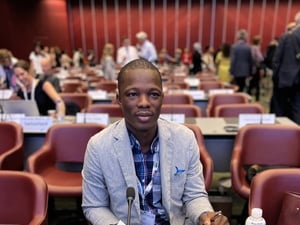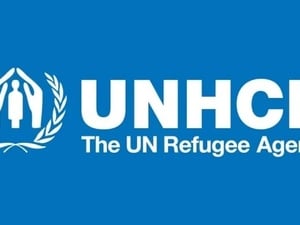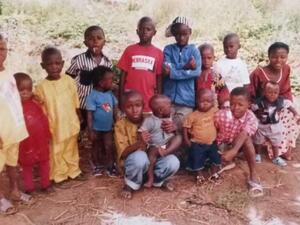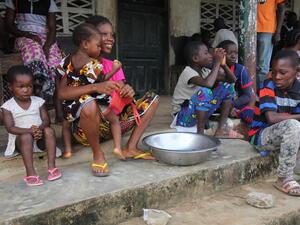Liberia: Groundwork for return operation of Sierra Leonean refugees
Liberia: Groundwork for return operation of Sierra Leonean refugees
UNHCR is laying the groundwork for the eventual land repatriation of thousands of Sierra Leonean refugees still in Liberia. As you know, most of them were displaced from their camps in and around Monrovia during the recent fighting in Liberia and were in a desperate situation. This week, another exploratory mission travelled to the Sierra Leonean border to assess the condition of roads both on the Liberian and Sierra Leonean sides. The team returned to Monrovia on Wednesday, after a two-day mission. They reported that the roads from Monrovia to the border are good, but that those from the border to Zimmi way station in Sierra Leone need major repairs. Road works will start as soon as possible. Some 14,000 Sierra Leonean refugees still in Liberia could be involved in the return operation.
Reception conditions are already in place at the Zimmi way station in Sierra Leone, with experienced field staff ready to receive, house and transfer large numbers of refugees and returnees. Until recently, the way station had hosted some 100 Liberian refugees fleeing insecurity in their country. They were relocated to a camp near Kenema on Wednesday.
UNHCR in Guinea has also reported the arrival in recent days of some 2,000 new Liberian refugees in the southern Guinean town of Fassankoni. They said they fled their homes in Liberia's Lofa County after the departure of the Liberian army and the announced takeover of their towns by the LURD (Liberians United for Reconciliation and Democracy).
In Liberia, registration is nearly completed in five camps for internally displaced people (IDPs) in and around Monrovia. UNHCR and the International Committee of the Red Cross (ICRC) have been providing relief supplies for these displaced Liberians, while new data collected through registration will allow the World Food Programme to start another round of food distribution. Other aid agencies have also been working to improve medical and sanitation facilities at the IDP camps. The International Medical Corps has set up a clinic in Wilson camp, World Vision will re-open another at Jahtondo camp, while Save the Children Fund is running a clinic through all the camps once a week. Work is also continuing on the camps' water and sanitation facilities that were damaged either during the recent fighting or after years of disuse. The transit shelters at these IDP camps are almost full, and the relocation of displaced Liberians from Monrovia has been put on hold until more shelters can be built.
Our work in Liberia got a boost this week with more funds from the United States, part of an additional US contribution of $20 million announced in Washington for UNHCR supplementary programmes, mainly in Afghanistan and Africa. Of this amount, $1.2 million will go to Liberia for UNHCR programmes assisting refugees and IDPs. The rest will go to Afghanistan ($14.5 million); the July 2003 "All Africa Appeal" ($ 4 million); Chad; programmes for Central Africa, Kenya, Republic of Congo and Uganda; and for the prevention of sexual and gender-based violence. These new funds bring the total US contributions this year to $294 million.









